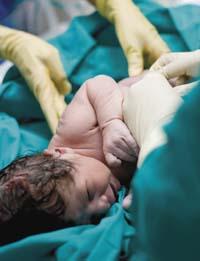Will you thank your child for keeping their cells?

EHUko ikertzaile kontratatua. Zuzenbidea eta Giza Genoma unibertsitate arteko katedra

The conservation of cord cells has as a "direct" goal the possibility of performing a bone marrow transplant to sick people, and the "potential" goal is the realization of future autologous treatments (that is, for your child). The effectiveness of clinical applications is very different in both cases.
Cord blood cells are very useful for transplanting to people with bone marrow diseases, such as leukemias, but you will hardly be able to use the original individuals. The reason is that behind many childhood transplants there are genetic or congenital diseases, so the disease may be present in umbilical cord cells. For non-congenital diseases, only autologous umbilical cord cell transplants have been performed in the world on three occasions, while more than 6,000 transplants have been performed with cells donated by others. It should be noted that the umbilical cord has very few hematopoietic stem cells, so they are only sufficient for transplantation to children or adults of very low weight, being the main technique used today is the direct collection of stem cells from blood circulation through simple methods and with very few complications. In addition, in some types of leukemia and lymphomas, for treatment to be effective, the vaccination reaction against the stranger that produces the collection of cells of a donor is fundamental, since it prevents relapse.
In addition to its usefulness for transplantation, news of advances in regenerative medicine indicates that the cells now preserved will serve in the future to form damaged tissues or organs.
Certainly, research in the field of cellular therapies is increasing interest (only in Spain more than 50 groups are being investigated and there are research centers dedicated exclusively to it), but their clinical applications continue to have a very low degree of development. On the other hand, it should be noted that in regenerative medicine is not only investigated with umbilical cord cells, but also with embryo and adult cells. That is, umbilical cord cells will not, in any case, be the only cells that can be applied in this type of therapies in the future.
It is therefore important to note that banks must provide truthful information on these options. The legislation expressly prohibits (to prevent excesses) misleading advertising: apart from the one based on current knowledge and experience, there can be no wrong impression on the autologous uses that can have the acquisition, processing and storage of human cells and tissues. In addition, promotion and advertising should always be done from a global point of view, no benefits can be sought for specific people and it should be indicated that it is voluntary, altruistic and disinterested.
Once the situation is known, when the pregnant woman wishes to be a cord donor, she must go to a cord blood bank in Spain or one of the authorized maternity homes. In Spain there are 132 such mothers and 14 public umbilical cord blood banks (in the Basque Country: Transfusion and Human Tissue Center of the Basque Country, Cruces Hospital and Donostia Hospital). The complete list is available on the National Transplant Organization website: www.ont.es
The birth center must have express authorization for the extraction of cells and the storage of the banks to which it is intended. In addition, the mother house and the bank must have a valid agreement or agreement.
All cells stored in this type of bank in Spain will be available to the Spanish Registry of Bone Marrow Donors (REDMO) and can be used to treat any patient who needs transplantation.
For the sending of blood abroad, under the same conditions as for storage in Spain, the extraction and storage centers must be authorized and sign an agreement. In addition, if the center is outside the European Union, authorization from the National Transplant Organization must be requested.
For possible autologous use, the cells can be stored in a private center that meets the requirements of the regulations. The activity of these centers must be non-profit, meet the same quality standards as public banks and make available to the National Registry of Bone Marrow Donors all units stored for use by any patient.
Pilar Nicolas. Researcher hired from the UPV/EHU. Inter-university Chair of Law and Human Genome





